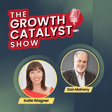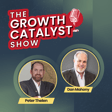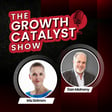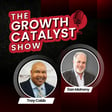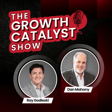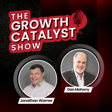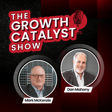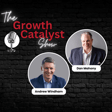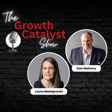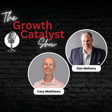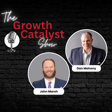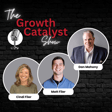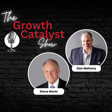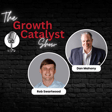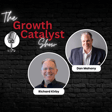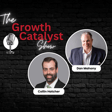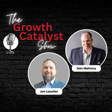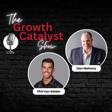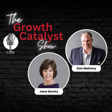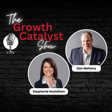Become a Creator today!Start creating today - Share your story with the world!
Start for free
00:00:00
00:00:01

Financial Foundations with Don Gage: A CFO’s Path to Success
Discover the pivotal role of CFO expertise in driving business growth with special guest Don Gage, a seasoned finance and operations leader. Dive deep into the experiences that shaped his strategic approach to overcoming challenges and propelling companies forward. Tune in for valuable insights that could redefine your financial strategy.
Transcript
Introduction and Guest Background
00:00:00
Speaker
Welcome to The Growth Catalyst Show where we believe that growth can come in many forms, professional, personal, company, sales, you name it. I'm your host, Dan Mahoney, founder of Transcendent Sales Solutions and a guide to a world of growth possibilities. I've spent my career empowering companies and their people with strategies that accelerate growth. I'm here to bring you stories of these business leaders and their trusted advisors to gain insights into their journeys and learn how they fueled their own growth. Just maybe their journey could become part of your own growth story. Are you ready? Let's grow.
00:00:34
Speaker
Welcome to the Girl Kindness Show. I'm your host, Dan Mahoney, and I'm excited to have my next guest here today. Don Gage is the managing director at Pro CFO Partners, where he assists clients in steering their companies forward using his expertise in law, finance, and business. He is a seasoned financial professional with 30 years of experience in finance, operational management, real estate, banking, and law. Don has served in executive roles at large national companies. Mid-Cap and Startup Ventures. Don, welcome to the Girls' Cattle Show. Appreciate it, Dan. Looking forward to talking today. Thanks for the invite.
Education and Career Beginnings
00:01:11
Speaker
Yeah, it's great to have you today. So as I was going through your background, I noticed that one of the things you did is went to U of I, University of Illinois in the land of Lincoln. So I'm assuming you're from Illinois if you went to U of I?
00:01:26
Speaker
I am. Yep. Grew up there, born and raised suburbs of Chicago, went to Illinois. Big 10 school is great. We hosted a lot of homecoming games. I think that was Illinois' role in the ah Big 10, but liking their direction now with the new coach and whatnot. So I love my time there. was It was a lot of fun. Well, as someone who grew up in Illinois, typically people who go to U of I are typically from Illinois, typically, yeah and mostly up. So where in the suburbs of Chicago did you grow up? Southwest side, Oak Forest. um So it's just I went to Marist High School, which is 115th and Pulaski, the exact city limits on the southwest side of the city of Chicago. So we were only less than 10 miles from there. strong So I'm going to assume that you're a Sox man.
00:02:15
Speaker
No, you would think so. get assumption yeah My whole family is. Yes. But I was the renegade. And I don't know exactly why, but I was a Cubs fan. I must have wanted more misery in my life because being a Cubs fan is is hard work. Although, you know, it only took him 108 years, but finally won again. So if history tells us anything, I guess we got a long wait before they won again. But yeah, I grew up a Cubs fan. My entire family, Sox fans, obviously Salson is white Sox territory. As a South Sider wearing that Cubs blue, you're a brave man. It was tough. yeah it was it was not Like I said, I decided not to make my life easy. I needed to challenge my life. so yeah so I saw that you found your way to Boston University and you know with that finance degree and started a ah law ah path. Tell me about that.
00:03:08
Speaker
Yeah, yeah. So from an early age, um, had the idea that I wanted to be in attorney law school. Nobody in my family, uh, is in law, but, uh, just was sort of attracted to it and went to Boston university for a change of pace. I grew up in the Midwest and so I wanted to kind of venture out and, uh, picked an East coast school and it was great. I mean, Boston, I described Boston as the world's largest college town. I mean, there's just a ton of universities across the river was MIT and just down the river is Harvard and ah Boston College not far. I mean, there's just literally probably easily a dozen schools, you know, probably to spend a couple of years.
00:03:52
Speaker
Yeah, so it was fantastic, enjoyed the experience, loved the and intellectual challenge of it. But by my third year, I kind of had a sense that the practice of law was not likely to be something I was going to do for the next 30 plus years.
Career Transition and Evolution
00:04:09
Speaker
um I studied finance undergrad, really enjoyed it. ah was attracted to them. My grandmother was with a stock brokerage company in Chicago, and I was just always very interested growing up, you know, kind of hearing what she did and and whatnot. And in college, as as the college mind typically works, I'm a sophomore. My undergrad, I knew I was going to law school, so my my majors were economics and ah political science, which means you you either better go to law school or you'll be unemployed. So um You know, in line sophomore year, the line is long. I'm guessing alcohol the previous night probably had something to do with my impatience. But I, you know, my I wandered over and I saw the finance line was shorter. um Walked over there and said, hey, if I switch to finance, will it, you know, will it mess me up while I still graduate in four years? They said, no, you're all your first year credits transfer. And that, you know, in that moment, I i switched to finance. and And honestly, one of the
00:05:12
Speaker
you know happiest set of circumstances because because i really enjoyed finance and then that obviously set myself on my path for what i really have done in throughout my career which has been in finance i i practiced a little bit in chicago but again that's not where my passion was and got into banking um and that was with first june in if you're keeping your scorecard it's now wells fargo but uh that makes Yeah, exactly. so But it was great. First Union was a serial acquirer. Everybody's first union story starts with they acquired the bank I worked for. I was no different. and But it was good because they were growing. And ah that's actually at that time I was living in Virginia and then they moved us to Richmond and then they moved us to Atlanta, which was good. I was happy to get back to
00:06:02
Speaker
you know, a larger city. um Virginia wass was fantastic, but I, you know, I was very happy to to get to Atlanta and ultimately all roads would have led to Charlotte, which is where I guess the east. Yeah, exactly. And, um, but before, you know, before I jettisoned into the home base, um, I got the opportunity to become the CFO for a real estate development company and multifamily builder here in Atlanta. And again, just a nice, really happy circumstance because when I was in banking, I was doing real estate, underlying underwriting. I ah led a team of underwriters and I really enjoyed the real estate and you know, then that,
00:06:44
Speaker
like I said, became the CFO for a multifamily can company here. We did class A multifamily. Our money was long, you know, in the sense that the investor was a wealthy individual. And so that allowed us to hold our projects, which is atypical. Usually it's a build, stabilize and sell situation. um So we had our own development company, construction company and management company. So that was my first exposure to kind of managing the staff and a team and whatnot. ah Well, they actually, first year I started that, but that's that's where I helped, you know, it's a smaller company. And so it's all hands on deck and, you know, everybody does everything. And and it was a great experience. And, you know, that just continued to lead down the real estate path.
00:07:27
Speaker
yeah So tell me a little bit about what you learned from being in that corporate career because you had, ah you know, one of the things I noticed from your background is I see CFO, but I also see COO as well. I see yeah a little bit of both of those to talk about some of your, you know, what you learned from those early experiences. Yeah, a big corporate was great, you know, working for a large national bank was great, it gives a great foundation. um And some people, you know, make their career out of it. But I, you know, for myself personally, and I think for a lot of people, it's that, you know, that on the job MBA, if you will, that that, you know, your, your
00:08:07
Speaker
learning a skill set and polishing a skill set and developing skills and management and whatnot. And then I, like a lot of others, then jettison to a smaller organization where, you know, you can see your footprints a little bit more. You have more authority, more responsibility. You're thrown into the deep end pretty quickly. You figure out if you can swim or not. um And so you're exactly right. but part You know, in in the transitioning to operations, while my title, because of my background finance and so my functional role was always CFO, but like even starting a cannon company, again, a small company, we did, you know, we did large projects and did over built over 3000 units and whatnot. But from a people headcount standpoint, you know, people actually working for the company W twos, it was probably about 20 or so people. And so, uh, Dick was the CEO, the cannon, great guy, uh, learned a lot from them. And, but yet,
00:09:03
Speaker
you know, that was it, you know, he was top, you know, didn't have any second layer really of management. And so just, just sort of filling a void. It was like, okay, I'm the CFO today and then tomorrow I'll be the COO and you know, maybe the next day I'll be the janitor and whatnot. ah Again, it was kind of a all hands on deck. And that's where I started to develop, you know, just just a broader base of of management experience.
CFO Consulting and Firm Dynamics
00:09:30
Speaker
um And that continued on, you know, I went on to develop a multifamily ah property with ah my partner from from ah
00:09:40
Speaker
can't accompany and and whatnot and that was you know each of us he was the on the ground development guy the construction guy uh knew how to put in the street etc etc and then i did everything else you know that's you know as any small business it's you know one of the two of us has to do everything so let's let's figure out you know what we're doing and that's just kind of continued and in my role as i got into cfo consulting work and now with pro cfo ah particularly in the past couple of years, I have found that my assignments so when I was doing this on my own and and servicing my own clients was pretty much an even split between CFO work and COO work. And it sort of makes sense because
00:10:25
Speaker
As a CFO, you know you're interpreting the numbers. The numbers are telling a story, but the numbers won't change themselves. In order to change the numbers, now you you have to walk across the street to the operation side of the business. People change the numbers. you know it's It's people's behaviors and whatnot and and whatnot. so It's a very short walk you know from the CFO side to the COO side. and A lot of companies don't you know, except for very large, you know, deeply layered hierarchy companies, ah they don't, they don't have those roles segmented and then they probably don't need to have those roles segmented. And so a good CFO should be able to easily step into the shows shoes of a COO and a COO, except for maybe their, their
00:11:10
Speaker
Hasn't see with numbers or version numbers They certainly should have a command of how the money is making money how the company is making money But it's probably easier for the CFO to be the CEO When do companies make that decision on the transition is because I see now you see a lot of CFOs wearing both hats make that hey we need we need a CEO of now and a CFO when Usually happen I would say that's probably gets into a pretty large organization where you have to start to segment that and it and it comes down to people management.
Personal Insights and Family Life
00:11:45
Speaker
um I was in a business group recently and I don't remember the number, but that you know how the army sort of segments its leadership as they figured out how many people you can effectively lead or manage, you know, how many headcount you can do. And that's how they have the different ranks and whatnot. um You know, so that's I would say the same thing if you if you find
00:12:05
Speaker
You know, the CEO is finding that they are have 25 direct reports. that That's too many. they They need to create another layer. And then, you know, maybe it's the COO slash CFO. But then if that grows to where that CFO, COO person is managing 20, that's too many. And you kind of find, you know, so as as the company grows, um it kind of finds its segmentation. Got it, got it. Before we talk a little bit about Pro CFO, um I know you and your wife, you have two sons and a daughter. One son and two daughters. yeah One son and two daughters. I'm sorry. i must But you can't tell from their names. Yeah, that's what that's an easy story. You can't tell from their names. And again, we talked a little bit about U of I, but you've got one firm that went to Auburn and one that went to out University of Alabama.
00:12:54
Speaker
Yes, so that is provided. It is literally the house divided. There is permanent tension. I would think savings have been ruined for the rest of our lives. i was just I want to come to your house and watch the iron wall because it's got to be bad. It's got to be some intensity. it's it's It is. I mean, talk about, you know, Michigan, Ohio State is a deep, deep rivalry, and there's others to mention, but I will say, and being a transplant, and so I, you know, literally, i you know, I don't have a dog in this fight. I'm from Georgia, you know, bulldogs and stuff like that. But so I'm a very enthusiastic but casual observer because I don't have the that passion in there. So the kids naturally, you know, when when they chose, they're only a year apart, you know, when one said, I'm going to Auburn and the next one, Alabama, the natural question became, dad, who are you going to root for? And I was like, I am not getting into this fight. So I said,
00:13:48
Speaker
I'll root for the home team, you know, whoever's the home team that you're all root for. And it's been a lot of fun. I mean, it's been just an incredible, ah you know, to go to those universities and experience that, um you know, they're deeply passionate. and And what people in the North might might understand is, you know, why is that? You know, and now but they don't have proteins. I mean, Alabama and Auburn are the proteins and same with Ole Miss and and whatnot. So in the South, ah college football is on another level. The first time I went to an Auburn game, you know my son was kind of preparing me and said, hey, you know, this is a big deal and stuff like that. I said, hey, you know, I went to a Big Ten school. I've seen big league football stuff.
00:14:35
Speaker
Our team wasn't, you know, performing the big league football, but Michigan on House Day came into town. So i'm I'm used to it. And I get down there and there's these signs that say no parking before Thursday. And so I said, to I said, Dakota, where did the students park? You know, before Thursday, he goes, that's for game day. I said, okay, I've got a second question. They know the games on Saturday, right? Um, so it is just incredible. I mean, people go down there, you know, nothing like going to an SEC football game. It is, yeah it is an experience at all of them. It is definitely a cult. So, um, so before we get into pro CFO, tell me, what do you like to do in your spare time for relaxation?
Pro CFO's Unique Model and Approach
00:15:21
Speaker
Yeah, I'm ah ah you know, I'm addicted to golf, which is a terrible addiction for you young people out there. If you can try not to go down that path. um But yeah, I enjoy golf and ah you know, we travel a little bit, but ah for the most part, you know, we just enjoy spending time with the kids. You know, they've they've gone on and and started their careers. My oldest daughter, the Alabama graduate, she's out in Colorado. I just got back from there and You know, it's just very rewarding to watch the kids kind of find their own footing and and and start to go down their own path. So between that and golf and then in the fall, watching college football seems to take up most of my time.
00:16:04
Speaker
the year goes very quickly. so So let's switch to pro CFO. I know there's a lot of CFO firms out there and everyone is there. They're not all the same. Everyone's very different and has their secret sauce. So give us the, give me the, you know, the, the elevator pitch about pro CFO. I'd love to learn about your firm and learn how, you know, how different you are at your value proposition. Let's take a moment for a quick word from our sponsor. This episode of The Growth Catalyst Show was brought to you by Transcendent Sales Solutions. Whether your company is facing uncertainty, declining sales or resource limitations, Transcendent Sales has the solution. Their team has decades of experience helping businesses find alignment to meet their growth goals and transforming underperforming sales organizations into revenue producing market leaders.
00:16:52
Speaker
They take a hands-on, results-oriented approach to solving sales challenges. Visit TranscendenceSales.com to learn more and subscribe to the biweekly Growth Catalyst newsletter for insightful growth strategies. Transcendence Sales Solutions, empowering businesses to reach new heights. And now, back to the show. Yeah, absolutely. The biggest differentiator, um and i I didn't realize it or know it at the time that I joined, but it's it is a CFO firm. And you think, well, Don, there's a lot of CFO companies out there and whatnot. And I and i started out when i when I transitioned into this, I was with, one of them had a great experience, um but that experience, that they the the
00:17:38
Speaker
current traditional playbook of CFO companies is the CFO landscape is, is comprised of solopreneurs. I've done that, you know, people do it on their own and then a collection of solopreneurs. And that's what I would refer to as these other companies is they're a company, but they they are this, the CFOs within it, are are they're sourcing their own clients, servicing their own clients, doing the admin work. Again, it's ah kind of the the company gives you a platform, if you will, but yourre own you're your own fiefdom. You're not part of you know a firm, per se. um So, ProCFO is a firm. Think of a law firm. Think of an accounting firm. Think of a large consulting firm.
00:18:24
Speaker
And oftentimes, what so in those instances, so what's the distinguishing factor? The firm is generating 70% plus of the client sourcing. you know The CFOs do a role, but their their primary role in Pro CFO is to serve as the clients. So the distinguished k client might say, that's interesting, Dom, but I don't really care how you found me and how you source me. How does that translate to a value add to me? So if I'm sourcing, that's that's my primary role as manager director is to grow the Atlanta area, both in terms of clients and in terms of CFOs to service the clients ah in the region.
00:19:04
Speaker
um so between myself, the other managing directors, the founders, Nelson and Holla, and the firm centralized marketing, we generate north of 70% of the clients, but yet I'm not going to retain that client service work. And so when I'm not going to retain the client service work, then who is, I pivot to what's in the best interest of the client. And it is, there's a number of factors. There's there's industry expertise, there's location, and then there's personality tech. Is this gonna be the right mess with with that owner, president, and and their team? um But industry is is usually the leading indicator of it. And so when I was doing it on my own, or with one of these other companies, which again, is a collection of entrepreneurs,
00:19:53
Speaker
I was doing the same activity and I would run across something and I'm no different than any CFO. I'm i'm an expert in one to three to four industries or fields. And then i i can I can do a good to adequate job in something outside of my wheelhouse. But think about it as a client. You're not looking for good to adequate. I mean, adequate is not even on the table and good was the floor of what you're looking for. you want expert. And so when I come across somebody and we have the whole variety of clients that you serve, there's no one CFO that would have that level of expertise. So when we come across it, it'd be like, well, Dan, tell me about your company, what industry area and what your challenges and whatnot. And so then based on that, I go into my, I have 50 CFOs, but I have two in the Atlanta area. I have 50 CFOs to draw from.
00:20:49
Speaker
because unless there is a specific region for the location, and sometimes, you know, it is dictated by the k client, and if so, we we we find somebody that all serves the location and the industry. is You know, short of the location being an issue, I just go into our deep a bench and and say, who's who's able to to make a meaningful impact immediately with that. And, you know, when you and ask that question, it's going to be, what's your experience level? For example, I i spent most of my career in real estate. So if I come across a real estate client, you know, I pass that credibility test very quickly, just in a five minute dialogue of, you know, you're talking about the industry and and whatnot, and they can they can sense that i I've been there, walked in those shows and know it.
00:21:38
Speaker
They want that same confidence if it's manufacturing, nonprofit, a service company, whatever it is. They want somebody who knows their business. They're not looking for somebody who will figure out their business. That's not what they pay us to do. So that that is definitely the big distinguishing factor. There's a lot of tremendous individuals out there in those other companies and and the solopreneurs. But when you're looking for somebody, particularly in in referral, you know, when when I'm out there networking with other people who aren't going to be a client, but refer, it's a lot easier for them to say, I don't want to figure out what you're good in and not good at.
00:22:17
Speaker
I just want to throw this over to you and say, put one of your expert CFOs on this so that you can take care of my friend, my client, whatever that relationship was, because giving referrals is, you know, the reason we're always hesitant in it is it's a reflection on us. You know, we we want to make sure that you're doing a good job. And so that white bulb moment, as I kind of got into the marketplace and described that difference, that's that's been an aha moment, both for obviously for the clients. They love hearing that. They're like, yes, that's exactly what I want.
Strategic Importance of a CFO
00:22:53
Speaker
But also for the networking partners. to say, okay, this is going to make my job a lot easier. I don't have to, you know, try to get a relationship with 10 CFOs and figure out, okay, exactly what's done, what's done good and what's Sandy good and et etc. They're just like, let me just go to pro CFO. And they've got somebody that will be good at what my client needs. So tell me when you go into a client engagement, and you start with a new client, what are some common things that you see that, you know, right coming in that are usually, you know, where the problems lie?
00:23:25
Speaker
Yeah, it's it's really a lot of our, virtually all of our assignments are somehow, some way related to their comfort or discomfort with their numbers. you know The typical business owner, and and you know some of these businesses will get to quite a large scale in terms of dollar amount, but yet typically the founder or the president is not from a finance background. you know, they're good at whatever product or service they deliver, and they're typically very passionate about it. So they're usually pretty good at selling it. And so their functional role, you know, becomes the chief, you know, advocate for their product or service, and then it grows and whatnot. And the accounting of finance is always something like, okay, that's, and honestly, in the first year or two, it's it's not that
00:24:17
Speaker
important, you know, it's figure out if you've got a company first before you worry about start to generate revenues before you worry about counting them, you know, so they've got to get get through that part. But then as the company grows, they they again, they sort of back table that is like, yeah, I should, you know, I should dig into that a little bit more, a little bit more, but it's not their highest priority, which, you know, is natural. And so When we get an engagement, when they you know get connected with us, it is typically they can't exactly put their finger on it, but they know something's missing. they're they're like and And I've had recently ah two different clients describe it the same way. is
00:24:57
Speaker
I want to be able to make decisions and feel comfortable with the decisions I'm making, you know, is I i find myself hesitant to make this decision because I'm like, do i am I analyzing the data correctly? And then when I make the decision, I'm not confident in it, you know, and so they start to get to the point where they're growing and they've got to start to make some pretty important decisions that, you know, yeah affect the the direction trajectory of the company. And so that's when they stumble upon. And a lot of times they'll say they very well might have somebody on their staff that's acting in the role of controller or CFO. They're likely a controller, very capable, very good controller, and that's what they need. And ah you know a common question is, what's what's the difference between a CFO and a controller? And it is,
00:25:54
Speaker
backwards-looking versus forwards-looking. You need a controller to in an accounting team to do the counting of what has happened, to take our analogy as a Cubs fan. What were the runs, hits, and errors of the game we played? A CFO is is where the owner comes in and says, should we get a new second baseman? You know, and it's like, okay, what's on the market? How much does it cost? Why are we thinking we need a second basement? What is the productivity levels? How is that going to get us to, you know, the world series and and what that is? That's a whole versus strategic. it's right That's exactly right. And you need
00:26:33
Speaker
the historical information as your basis, but you're right. that the The owners are coming to us and saying, I don't feel comfortable with the strategic decisions that I'm making. and And the reason being is they don't have that strategic financial partner on their team. So that's, and that's the role that we serve. And to tell you the truth, most companies don't need a full-time CFO. um You know, when people, ah you know, when I'm engaging out there networking and everybody's like, okay, I work with small to medium businesses from X to Y. I've gotten away from the X and Y because we all watered down the X because let's say our number was two to $10 million as a sweet spot. But then I'd say, well, I do work with clients a million. So then I say a million. And then it's like, well, I would work with clients for $20 million. So I say 30 million.
00:27:24
Speaker
People watered down the action, the wine. We basically just end up eliminating the person who cuts her lawn and Amazon. And so it's like, okay, that doesn't tell me a lot. So what i how I answer it now is a couple of years and a couple of million dollars. the The business has been around for a couple of years and they've generated a couple of million dollars in revenue. That's the point in which they start to need you know, a CFO. And then once they start to need a CFO, they never stop needing one unless they sell the company or it grows to the complexity where it's like, hey, I need a full time CFO. There's there's enough to do here. But most companies don't need that short of you being a public company or a company that's constantly in the capital markets, debt and equity. You're always doing transactions or you become really large and complex, multiple divisions. um Maybe you're transacting business overseas, you know, so you get different currencies and stuff, you know it's it's just become this big, large, complex thing. It's not a dollar amount. We've got clients $50 to $100 million. dollars it's It's more of a complexity. So anybody so you know anybody short of that, which is probably 90% of the companies out there need some form of a CFO, but they don't need one on a permanent basis.
00:28:35
Speaker
What I see sometimes is you have the CFO title in the business, but really they're more of a controller. correct yeah yeah yeah yeah And the owner doesn't know that, so they're thinking, I've got a CFO, but but something's missing. yeah What they have is an excellent controller, and they need that person. And we don't go in and change titles. you know we don't you know We don't do that. We just come in to help. you know As you can imagine, ah you know when we first come in, the finance team, is and you know they're thinking why. And so they they they feel challenged in the operations team as well, because to your earlier point, a lot of what we do, we become a member of the C-suites. That's the other thing. These companies don't have
00:29:21
Speaker
you know, a C-suite, they're not large enough. They might have one or two key people within their organization that they talk to. But even then, you know, they don't feel comfortable telling them everything. And so they, you know, got a friend or something like that. That's the one advantage. like While we don't consider ourselves consultants and we don't consider ourselves fractional because the CFO consultant is outside and fractional is part time and the CFO is neither one of those. So we are our client's CFO. It's just the hours that different. A full-time CFO to one company is 30 hours a month. you know And in a full-time CFO to you know a huge company is a full-time equivalent is this 2,200 hours. And so it's anywhere in there. But for the company that you know needs a CFO for 400 hours in a year, that's you are their full-time CFO. Think of it. if you know if If you introduce your friend who's and you who's your attorney or your accountant,
00:30:17
Speaker
You don't introduce him in a party and say, this is Barbara. She's my fractional account. You said this is Barbara. She's my account. It's it's understood and known that she's not on your payroll. She's not a
Client Success Stories and Outcomes
00:30:28
Speaker
full time employee. She does all the accounting that you personally need and same with your attorney. So we're no different in that regard is in the one thing that does help because we are not in the organization. That separation allows the owner to come to us So I don't have any personal investment in my fiefdom within the organization. So when the owner comes and asks me a question, you know, about HR or should we you know relocate to Indiana or whatever it is, they know that I'm not going to be like, geez, I don't want to relocate to Indiana. So I'm going to, I'm going to, you know, poo poo this idea because I don't love where he's going with this or, you know, what do you think about Bob? Well, Bob's my fishing buddy. I think Bob's a great guy. you know i don't I don't bring any of that into it. And so they'll get the honest counsel. It's not that the employees are doing them a disservice, but we're all human beings and we all operate out of self-interest. And so we don't have- It's always, what does it mean for me? Absolutely. yeah and yeah So for us, it's just like, OK, let me give you some honest counsel on that, because whatever decision you make, move to Indiana, you know, release, Bob, whatever it is, it's, you know, it's not going to affect my world. I don't have any I don't have any, you know, impact. It's it's not going to impact me. And so therefore I'm going to give you honest counsel.
00:31:54
Speaker
Absolutely. Well, and I always as a fractional sales leader, just, Hey, my interest is the owner, the CEO is your interest. And I have nothing but your interest at heart. And you know, that's my skin in the game is your success. That's exactly right. Yeah. So Don, share a, share a brief success story of somebody that a company that pro CFOs work with and give us a little bit of a, you know, what you guys have come into and the outcome. Yeah, so for ours, the engagements yeah are long standing. And so the outcome is you're continuing to help the company grow and succeed. And, you know, recently have onboarded the company that great sales
00:32:40
Speaker
um North of 20, $25 million. Uh, but they're in a very, uh, price competitive business. So very thin margins, but their margins are lower than, than they should be. And so, uh, you know, we'll be able to, with, with, uh, some changes and some recommendations, be able to significantly improve those margins. It's, it's scary to operate a 25, but you know, they'll net, $700,000, $800,000, and think, wow, okay, more is always better, but that's good. But when you're operating a $25 million dollars company, the cash flows you know can swing dramatically. It's not as steady. If I'm making $900,000 a year, bottom line, it's not a steady $75,000 each month.
00:33:27
Speaker
And if I've got $25 million dollars in sales, we're talking hundreds of thousands of dollars, millions of dollars on a monthly basis and a swing. And so this company that if they can get to the finish line is going to net $7,800,000. There will be times during the year where they're They're break-even or negative, and that causes a lot of sleepless nights. We should be able to, ah there's there's many initiatives that will help them, with but we should be able to to turn that around and add another $7,800,000. Again, using industry experience, the classic example, these are founders that are very passionate.
00:34:03
Speaker
they're excellent at selling their product, and representing their product, but they don't have the background of finance. And so some of the historical decisions and agreements that they've made and whatnot have compressed their margins. And so it's very rewarding when we get to that point of where now they've got some breathing room and now they can make decisions because they've got the money so that they can be a little bit more forward looking just as opposed to reactionary. So that would be, ah you know, A good example of what we do in terms of the wins are the company is thriving, the owner is feeling less pressure, the owner is optimistic. um Recently, i yeah you know I had a client that my initial introduction to her was she was thinking of selling. and
00:34:55
Speaker
She loved her business. She had built a great business, but she had made some personnel ah decisions and kind of lost control of the company a little bit, you know, and um they, you know, it was not the right people. you know, right people, right seats situation. And, you know, I recognize that pretty early on. We, we made those changes. So again, it's like, geez, Daniel, the CFO, and now all of a sudden you're you're rearranging, you know, the chairs on the deck. Uh, again, it, it, it is a short walk across the street to operational because we weren't going to be able to fix the numbers until we got the right people there. And the wrong people were causing her to not want to own the company anymore. And, and she,
00:35:39
Speaker
She was the driver of the company. Without her passion and her leadership, the company wasn't going to survive. So we made those changes. And this it's been extremely rewarding because she's fully engaged now and looking to, you know. nine months ago, I think I want to sell. Can you help me with my numbers to now? Should we expand to Florida? Should we expand throughout the Southeast? There's a lot of potential and it's those sorts of things that are extremely rewarding. So I won't have the final success story until you know we grow the company and and and she hands it off to the employees or sells and stuff like that. But you know our role is again, once they start to engage with us,
00:36:17
Speaker
they don't stop needing us until that termination event.
Contact Information and Outreach
00:36:21
Speaker
And so it's, it's a, you know, it's a very rewarding journey of milestone improvements and accomplishments. So you've got a lot, you know, and it's, it's extremely rewarding to watch that. And you would think, well, it's not your company and stuff like that, but you, you develop a great relationship with these people and you're their biggest cheerleader, you know, and so their wins, you know, you love to celebrate and and their challenges, you you know, you take head on. So it's it's extremely rewarding to to so be able to help a diverse group of clients on their path to to what their original vision was. And then that happens a lot too, is like, man, when I got into this, I was so excited and so passionate. And now it's become drudgery. you know it And and and to to kind of restore that spark to them again, to take some of that off their hands um so that they can focus on what they're good at.
00:37:14
Speaker
which is their passion and their vision and their front-facing leadership, um that's you know that's our role and that's what we enjoy doing. Well, and it's and that's a great example, a couple of examples of what you guys do. And I think it's it's it says a lot about our, we'll call it our fractional business, whether you're in finance or sales or CFO or operations or HR, we hear these stories all the times where we're able to go in and bring that vigor back because we're a new set of eyes. And you know and again, we we know how to move quickly in what we do ah based on our expertise. So Don, this has been a great conversation. I've really enjoyed it. Last question is, if someone's interested in talking to Don Gage or learning more about Pro CFO, what's the best way to do that?
00:38:05
Speaker
ah You know, our website, my contact information's on there, so Pro CFO Partners, um you know, and my email ah is Don.Gage and Pro CFO Partners. um So, yeah, I mean, reach out or it's easier to reach out to you, Dan, because, you know, your audience knows you, that's fine, and we'll find its way to my door. But go on to our website and and and we'll be able to connect. And you're also very active on LinkedIn as well. here Yeah, yeah. It's easy to find on LinkedIn. So Don, I appreciate you taking the time today and thanks for preparing on The Grow Catalyst Show.
00:38:43
Speaker
Appreciate it.
